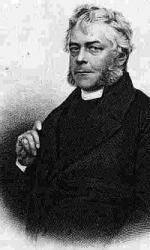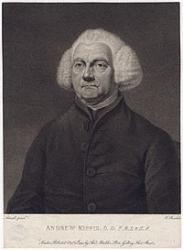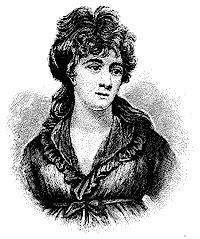Planning worship?
Check out our sister site, ZeteoSearch.org,
for 20+ additional resources related to your search.
- |
User Links
Person Results
‹ Return to hymnal




Export as CSV
W. M. Bunting

1805 - 1866 Hymnal Number: d5 Author of "A strong tower is the Lord our God" in Family and Social Melodies Bunting, William Maclardie, son of Dr. Jabez Bunting, a well-known Wesleyan minister, was born at Manchester, Nov. 23,1805, and educated at the Wesleyan Schools at Woodhouse Grove, and Kingswood, and at St. Saviour's Grammar School, Southwark. In 1824 he entered the Wesleyan Ministry, and continued in active circuit work for twenty-five years. Failing health then compelled him to retire upon the Supernumerary list, when he took up his residence in London, and died there on Nov. 13, 1866. In addition to editing the Select Letters of Agnes Bulmer, &c, 1842, and engaging in other literary labours, he contributed hymns to the Methodist Magazine (under the nom de plume of Alec) from time to time, and specially 43 to Dr. Leifchild's Original Hymns, 1842. Of these Dr. Leifchild rejected 8, and abbreviated 2. In 1842 these 10 hymns were published as An Instrument of Ten Strings, strung in aid of the Wesleyan Missions, By Alec. Other hymns by him were included in his Memorials, &c, published by the Rev. G. S. Rowe in 1870. Although a few of these hymns have come into common use, they have failed as a whole to command public attention.
Those in common use are:—
1. Blessed are the pure in heart, They have, &c. Purity.
2. Blest Spirit! from the Eternal Sire. Holy Spirit.
3. Dear is the day which God hath made. Sunday.
4. Father, our child we place. Holy Baptism.
5. Holy Spirit, pity me. Lent.
6. O blessed, blessed sounds of grace. After Sermon.
7. O crucified, triumphant Lord. Holy Baptism.
8. O God, how often hath Thine ear. Renewing the Covenant. Written in 1824, and given in the Supplement to the Wesleyan Hymn Book 1830. This is the best known of his hymns.
9. Thou doest all things well. God all in all. Most of these hymns are in the revised Wesleyan Hymn Book, 1875; Nos. 1-4 and 6 were in Dr. Leifchild's Original Hymns, 1842, and all are in the Memorials, 1870.
-- John Julian, Dictionary of Hymnology (1907)
==================
Bunting, William Maclardie, p. 193, ii. Of his hymns named here, Nos. 1-4, and 6, were in Leifchild's Original Hymns, 1842: as also, "We love to call creation Thine." (Missions.) The hymn, "Rites cannot change the heart," in the American Methodist Episcopal Hymnal, 1878, begins with stanza iii. of No. 4, "Father, our child we place." His hymn, No. 9, "O God, how often hath thine ear," was written at the age of 15, and was first published in the Methodist Magazine for Jan. 1824.
--John Julian, Dictionary of Hymnology, Appendix, Part II (1907)
W. M. Bunting
David E. Ford

1797 - 1875 Hymnal Number: d154 Author of "How vain is all beneath the skies [sky]" in Family and Social Melodies Ford, David Everard, son of a Congregational Minister at Long Melford, was born there on Sept. 13, 1797. He became pastor of the Congregational Church at Lymington, in Oct. 1821; Travelling Secretary to the Congregational Union in 1841; and pastor of Greengate Chapel, Salford, Manchester, in 1843. He died at Bedford, Oct. 23, 1875. Mr. Ford published several works including, Hymns chiefly on the Parables of Christ, 1828. From this is taken, (1) "Earthly joys no longer please us" (Heaven Anticipated). (2) "How vain is all beneath the skies" (Heaven Anticipated). These are in American common use. See Hymns of the Church, 1869, and Laudes Domini, 1884. Another of his hymns in common use from the same work, p. 107, is:—"Almighty Father, heavenly Friend" (Old and New Year). This is in Dale's English Hymn Book, 1874.
--John Julian, Dictionary of Hymnology, Appendix, Part II (1907)
David E. Ford
James Merrick
1720 - 1769 Hymnal Number: d29 Author of "As pants the hart for cooling flood [springs] [streams]" in Family and Social Melodies Merrick, James , M.A., was born in 1720, and educated at Oxford, where he became a Fellow of Trinity College. He entered Holy Orders, but his health would not admit of parish work. He died at Reading, 1769. His publications include:—
(1) Messiah, a Divine Essay. Humbly dedicated to the Reverend the Vice-Chancellor of the University of Oxford and the Visitors of the Free School in Reading. By James Merrick, Ætat. 14, Senior Scholar of the School at their last Terminal Visitation, the 7th of October, 1734. Reading. (2) The Destruction of Troy. Translated from the Greek of Tryphiodorus into English Verse, with Notes, &c. 1742. (3) Poems on Sacred Subjects. Oxford . 1763. (4) The Psalms of David Translated or Paraphrased in English Verse. By James Merrick, M.A., late Fellow of Trinity College, Oxford. Reading. J. Carnan and Co. 1765. 2nd ed. 1766. A few only of these paraphrases were divided into stanzas. In 1797 the Rev. W. D. Tattersall pulished the work "Divided into stanzas for Parochial Use, and paraphrased in such language as will be intelligible to every capacity . . . with a suitable Collect to each Psalm from the Works of Archbishop Parker."
Merrick's paraphrases, although weak and verbose, were in extensive use in the early part of the present century, both in the Church of England and with Nonconformists. They have, however, fallen very much into disuse. Those in modern hymn-books, mainly in the form of centos, include:—
1. Blest Instructor, from Thy ways. Ps. xix.
2. Descend, O Lord! from heaven descend. Ps. cxliv. (In time of National Peril.)
3. Far as creation's bounds extend. Ps. cxlv.
4. God of my strength, the wise, the just. Ps. xxxi.
5. He who with generous pity glows. Ps. xli.
6. How pleasant, Lord.Thy dwellings are. Ps. lxxxiv.
7. Lift up your voice and thankful sing. Ps. cxxxvi.
8. Lo, my Shepherd's hand divine. Ps. xxiii.
9. Lord, my Strength, to Thee I pray. Ps. xxviii.
10. My heart its noblest theme has found. Ps.xlv.
11. O let me, [gracious] heavenly Lord extend. Ps. xxxix.
12. O turn, great Ruler of the skies. Ps. li.
13. Praise, O praise the Name divine. Ps. cl.
14. Sing, ye sons of [men] might, O sing. Ps. xxix.
15. Teach me, O teach me, Lord, Thy way. Ps. cxix.
16. The festal morn, my [O] God, is come. Ps. cxxii, (Sunday Morning.)
17. The morn and eve Thy praise resound. Ps. lxv. (Harvest.)
18. To Thy pastures, fair and large. Ps. xxiii.
From his Poems on Sacred Subjects, 1763, the following centos have also come into common use: --
19. Author of good, to Thee we turn. Resignation.
20. Eternal God, we look to Thee. Resignation.
21. 'Tis enough, the hour is come. Nunc Dimittis.
John Julian, Dictionary of Hymnology (1907)
James Merrick
Benjamin Williams
1725 - 1795 Person Name: B. Williams Hymnal Number: d278 Author of "Our children thou dost claim" in Family and Social Melodies Williams, Benjamin, 1725-1795. Presbyterian minister at Salisbury, who in addition to a volume of Sermons, 1770, and the Salisbury Hymn Book, 1778, published The Book of Psalms as translated, paraphrased or imitated by some of the most eminent English poets, &c. Salisbury, 1781. His best known hymn, "Holy, holy, holy Lord," in celebration of the Divine Goodness, is in his own Collection, Kippis, Martineau’s Hymns for the Christian Church and Home, Martineau’s Hymns of Praise and Prayer, and Belfast Collection.
--John Julian, Dictionary of Hymnology (1907)
Benjamin Williams
Robert Carr Brackenbury
1752 - 1818 Person Name: R. C. Brackenbury Hymnal Number: d227 Author of "My son, know thou the Lord" in Family and Social Melodies Brackenbury, Robert Carr, of an old Lincolnshire family, was born at Panton House, in that county, in 1752. He entered into residence at St. Catherine's Hall, Cambridge, but joining the Wesleys, he left without taking a degree, and became a minister of the Methodist denomination. In that capacity he visited Guernsey, Jersey and Holland. He retired from active work in 1789, and died at his residence, Raithby Hall, near Spilsby, Aug. 11, 1818.
His works include:—(1) Sacred Poems, in 3 parts, Lond., 1797; (2) Select Hymns, in 2 parts, Lond., 1795; (3) Sacred Poetry; or Hymns on the Principal Histories of the Old and New Testaments and on all the Parables, Lond., 1800, and some prose publications. He also edited and altered William Cruden's Divine Hymns, n.d. The hymn, "Come, children, 'tis Jesus' command," was given in J. Benson's Hymns for Children, 1806. It does not appear in any of Brackenbury's works. Mrs. Smith, daughter of Dr. Adam Clarke, has included several incidents in his life in her Raithby Hall.
-- John Julian, Dictionary of Hymnology (1907)
Robert Carr Brackenbury
Andrew Kippis

1725 - 1795 Hymnal Number: d275 Author of "On thee, each morning, O my God, My waking thoughts attend" in Family and Social Melodies Kippis, Andrew, D.D., was born at Nottingham, March 28,1725, and educated for the ministry under Dr. Doddridge at Northampton, 1741-46. After a short residence with congregations at Boston and Dorking, he settled in London in 1753, as minister of the Princes Street Chapel, Westminster. There lie remained till his death in 1795, holding rank as the leading Presbyterian minister in the metropolis. For many years he was classical tutor at the Hoxton Academy, and afterwards at the Hackney College. He contributed largely to the Gentleman's Magazine and the Monthly Review, and edited five volumes of a new edition of the Biographia Britannica, a work commenced in 1778, and interrupted by his death on Oct. 8, 1795. His Life of Captain Cook was also published separately, and to his edition of Lardner's Works (1788) a Memoir was prefixed. His degree of D.D. was con¬ferred by the University of Edinburgh in 1767.
He was joint editor of A Collection of Hymns and Psalms for Public and Private Worship, selected and prepared by Andrew Kippis, D.D., &c. ; Abraham Rees, D.D., &c.; Rev. Thomas Jervis, and Rev. Thomas Mor¬gan, LL.D., London, 1795. This collection, commonly known as Kippis's, but sometimes as Kees's, passed through many editions, a Supplement being added in 1807, and was very generally used during the early decades of this century by congregations of Presbyterians and others, then become Unitarian in London and throughout the country [Unitarian Hymnody, § 9]. It contained 690 hymns.
The aim of the editors in their selection was to avoid “everything of a doubtful or disputable kind," and they adopt the language of Dr. Watts in the preface to his Hymns, "The contentious and distinguishing word of sects and parties are excluded." The alterations and omissions to adapt various hymns to the standard of the editors are considerable, though very little compared to what was done by others before and after them. The tone of the collection is somewhat colourless, and it gradually gave place among Unitarians to others which contained fuller and more varied expression of distinctively Christian feeling.
Two hymns by Kippis appear in this Collection.
1. Great God, in vain man's narrow view, The Incomprehensibility of God, which was generally adopted in later Unitarian books, and appears in Martineau's Hymns, 1840 and 1873.
2. How rich thy gifts, Almighty King, National Thanksgiving, which is four stanzas of the hymn, "Say, should we search the globe around," written for the thanksgiving appointed Nov. 29,1759, and appended to his Sermon on that occasion. It was given in full in Pope's Collection, 1760; and the Liverpool Octagon Collection, 1763. In Lindsey's Collection, 1774, five stanzas are given; in other early books only four, as in Kippis. The last two stanzas, somewhat altered, appear anonymously as: "With grateful hearts, with joyful tongues," in the Congregational Hymn Book, 1836, and the New Congregational Hymn Book, 1859.
[Rev. Valentine. D. David, M.A.]
--John Julian, Dictionary of Hymnology (1907)
Andrew Kippis
Richard Burdsall
1735 - 1824 Hymnal Number: d336 Author of "Hallelujah to the Lamb who hath purchased" in Family and Social Melodies Burdsall, Richard, for many years a Wesleyan minister, was born in 1735, and died in 1824. To his Memoirs, published at York, n.d., is appended a hymn beginning, "Now Christ He is risen, the Serpent's head is bruised." The hymn “The voice of free grace cries—'Escape to the mountain,'" begins with stanza ii. of this hymn, but with alterations. In some American hymnals, including Hatfield's Church Hymn Book, 1872, Burdsall's two stanzas are expanded into five, but by whom we cannot say.
--John Julian, Dictionary of Hymnology, Appendix, Part II (1907)
Richard Burdsall
Amelia Opie

1769 - 1853 Hymnal Number: d342 Author of "Shall I be mute" in Family and Social Melodies Opie, Amelia, née Alderson, daughter of Dr. Alderson, a physician at Norwich, was born there Nov. 12, 1769. In May 1798 she was married to John Opie, the painter, who died in 1807. Originally Mrs. Opie was an Unitarian, but in 1814 she joined the Society of Friends. Most of her subsequent life she lived at Castle Meadow, Norwich, where she died Dec. 2, 1853. Mrs. Opie's prose works were somewhat numerous, and included Father and Daughter, 1801, a most popular tale; Temper, 1812; Tales of Real Life, 1813; and others. Her poetical works were Miscellaneous Poems, 1802; The Warrior's Return and Other Poems, 1808; Lays for the Dead, 1833, &c. Very few of her poems have come into use as hymns. The best known is “There seems a voice in every gale."
--John Julian, Dictionary of Hymnology (1907)
===================
Opie, Amelia , p. 871, i. Another hymn by Mrs. Opie in common use is "When the disciples saw their Lord" (Travel by Sea and Land), in Com. Praise 1879. Dated 1838.
--John Julian, Dictionary of Hymnology, Appendix, Part II (1907)
Amelia Opie
Jonathan Evans
1748 - 1809 Hymnal Number: d74 Author of "Come, thou soul transforming [enlivening] Spirit [Savior]" in Family and Social Melodies Evans, Jonathan, born at Coventry in 1748 or 1749. He was the son of a working man, and as a youth was employed in a ribbon manufactory. About 1778 he joined the congregation at Coventry, over which the Rev. G. Burder was pastor. He began preaching at Foleshill, near Coventry, in 1782, and in 1795 he began his stated ministry there, retaining the same to his death on Aug. 31, 1809. Two biographical notices of him appeared in the Evangelical Magazine (Oct. 1809, and March 1847), and also several of his hymns. Two of his hymns appeared in Burder's Collection, 1784, and another in the 2nd edition the same year. His best known hymns are, "Come, Thou soul-transforming Spirit,” and "Hark! the voice of love and mercy;" q.v. He published no poetical work or collection of hymns.
-- John Julian, Dictionary of Hymnology (1907)
Jonathan Evans
Alfred A. Woodhull
1810 - 1836 Hymnal Number: d117 Author of "Great God of nations now to thee" in Family and Social Melodies Woodhull, Alfred Alexander, M.D., grandson of John Woodhull, D.D., of Freehold, New Jersey; was born March 25, 1810, educated for the medical profession, and practiced at Princeton, where he died Oct. 5, 1836. His hymn, “God of the passing year to Thee," appeared as No. 406 in the official edition of Presbyterian Psalms & Hymns, Princeton, in 1829. It has attained to extensive use in the altered form as "Great God of nations, now to Thee." Its authorship was determined by Dr. Hatfield, in his Church Hymn Book, 1872, No. 1295. It is an American National Thanksgiving hymn. [Rev. F. M. Bird, M.A.]
-- John Julian, Dictionary of Hymnology (1907)
Alfred A. Woodhull


 My Starred Hymns
My Starred Hymns


